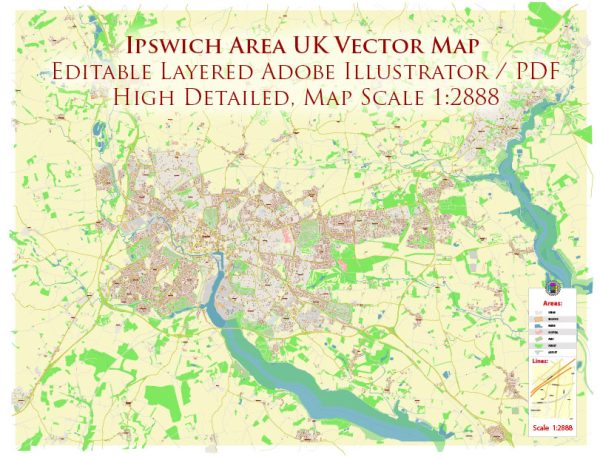Ipswich is a historic town in Suffolk, England, with a rich urban history dating back over a thousand years.
Vectormap.Net provide you with the most accurate and up-to-date vector maps in Adobe Illustrator, PDF and other formats, designed for editing and printing. Please read the vector map descriptions carefully.
Here is a detailed overview of its urban history and street system:
Early History:
- Roman Period: Ipswich has Roman origins, with evidence of a Roman fort established around 43 AD, during the Roman conquest of Britain. The settlement was known as Gippeswic.
- Medieval Period: The town grew during the medieval period and became an important trading port. Ipswich was granted a royal charter by King John in 1200, allowing it to hold a market and paving the way for economic development.
Medieval Street System:
- Street Layout: The medieval street system of Ipswich was characterized by narrow, winding streets, reflecting the organic growth of the town over the centuries. Streets such as St. Peter’s Street and Silent Street have preserved some of this medieval character.
- Market: The market has been a central feature of Ipswich since the granting of the charter. The Cornhill, a market square, has been a focal point for commerce and social gatherings.
Tudor and Stuart Periods:
- Economic Prosperity: Ipswich continued to prosper during the Tudor and Stuart periods, with the wool trade playing a significant role in its economy.
- Expansion: The town expanded, and new streets were laid out. However, the overall medieval street pattern remained intact in many areas.
Georgian and Victorian Eras:
- Industrialization: The Industrial Revolution had an impact on Ipswich, bringing economic changes and population growth. The waterfront became a hub of industrial activity.
- Urban Development: The Georgian and Victorian eras saw more organized urban planning. Streets like St. Matthew’s Street and Tacket Street were developed during this time.
- Railway Development: The arrival of the railway in the mid-19th century further boosted the town’s connectivity and economic development.
20th Century:
- Modernization: Ipswich continued to evolve in the 20th century. Modern infrastructure and developments, such as the Buttermarket shopping center, contributed to the changing urban landscape.
- Post-War Reconstruction: Like many towns in the UK, Ipswich underwent reconstruction after the damages inflicted during World War II. This period saw the introduction of new architectural styles and the rebuilding of certain areas.
Contemporary Period:
- Regeneration: In recent years, Ipswich has undergone regeneration projects to enhance its urban environment. Redevelopment of the waterfront area, including the University of Suffolk campus, has been a significant part of this effort.
- Transportation: Improvements in transportation infrastructure, including road networks and public transport, continue to shape the accessibility and layout of the town.
Street System Today:
- Diverse Streets: Ipswich’s street system today is a mix of historic medieval lanes and squares, Georgian and Victorian thoroughfares, and modern developments.
- Waterfront: The waterfront area, once industrial, has been transformed into a cultural and residential hub, featuring modern apartments, restaurants, and recreational spaces.
In summary, Ipswich’s urban history reflects its evolution from a Roman settlement to a medieval market town, through industrialization and modernization. The street system showcases a blend of historical charm and contemporary development, making Ipswich a town with a diverse and rich urban character.


 Author: Kirill Shrayber, Ph.D.
Author: Kirill Shrayber, Ph.D.